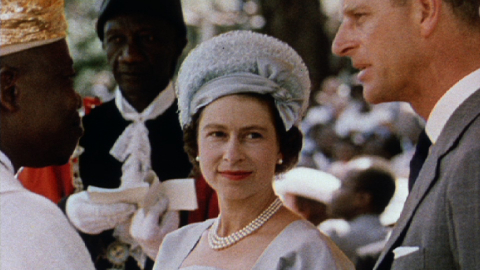This film is part of Free

Sierra Leone Greets the Queen
The Queen and Prince Philip's visit in late 1961, the year Sierra Leone became independent from Britain.
Overview
Watching Sierra Leone Greets the Queen gives one a flavour of the hectic nature of royal tours; in just one week (from the 25th November to the 1st December 1961) the Queen and Prince Philip covered an exhausting array of sights, zooming around the country to take in the capital city Freetown, Bo, the Guma Dam, digging for diamonds (Sierra Leone’s biggest export), Hangha and observing the iron ore works at Marampa. The film, shot in Eastmancolor, was directed by T. Cummins, who made several royal visit films for the COI. The visit was politically significant - Sierra Leona had become independent from Britain in April the same year. However, the film’s bias remains staunchly British - of the many Sierra Leoneans met by the Queen, only Prime Minister Sir Milton Margai is directly named in George Elliott’s clipped commentary, and while a speech given by the Queen praising Margai’s leadership is included, we hear nothing from the Prime Minister or any other local dignitaries. Colonialism’s influence is felt throughout the film, and not just in the place names (Victoria Park, Queen Elizabeth II Quay) - the ‘day in the life of a Bo schoolboy’ seems not radically different from the British equivalent, while the ‘children’s rally’ consists of boys dressed impractically in boaters and blazers, and girls marching in gymslips. Fortunately not all local flavour is diluted - one parade, featuring the Southern Provinces paramount chiefs and striking ‘attendant demons’, is one of the highlights of the film. We also see a military parade of the 1st Battalion Royal Sierra Leone Regiment, glimpse a lavish royal durbar, and visit the Eastern Province agricultural show. The visit is rounded off with two gifts for the visiting royals - a diamond for the Queen and an even more exotic present for the Prince Consort.
Margai, a popular prime minster, died three years after this film was completed. He was succeeded by his half-brother, Albert Margai, a controversial figure whose tenure was marked by accusations of corruption. While the country’s more recent history may be synonymous with bloodshed - not least thanks to Naomi Campbell's much mocked appearance at The Hague, explaining an alleged gift of blood diamonds from Liberian President Charles Taylor, on trial for crimes against humanity in the Sierra Leone Civil War - this film shows an excited, hopeful land predicting a bright future.
Related

London Line Colour No. 16 London Line Colour No. 16
Cinemagazine 1968 14 mins Silent Location: Surbiton
What do "I'm Backing Britain", electronic music and nuclear lighthouses have in common? Nothing at all, but they're all here in this 60s TV magazine show.

Nurse and Martyr Nurse and Martyr
Biopic 1915 11 mins Silent
The moving true story of wartime heroine Nurse Edith Cavell, recreated in the aftermath of her execution.

Spare Time Spare Time
Documentary 1939 14 mins Location: Sheffield
A rare glimpse into the leisure pursuits of ordinary people in pre-war Britain.

Battle Front in Britain Battle Front in Britain
Documentary 1918 24 mins Silent
Growing potatoes in Green Park plus some handy uses for your old tin cans – it’s all part of the war effort on the home front.

The Queen's State Visit to Iran The Queen's State Visit to Iran
Documentary 1961 14 mins
2-6 March 1961 saw the Queen and Prince Philip make their first and only state visit to Iran. Their host was Mohammed Reza Pahlavi (1919-80), the Shah of Iran, who had already made an official visit to Britain in 1959.

Zandra Rhodes Zandra Rhodes
Government sponsored film 1981 15 mins
Early 1980s portrait of fashion designer Zandra Rhodes, by fellow avant-garde creator, Peter Greenaway.

If I Make It To The Morning If I Make It To The Morning
Drama 2024 9 mins
A Chinese teenager dreams of living with her cool aunt in New York, until tensions boil over during a crab dinner.

We’ll Go Down in History We’ll Go Down in History
Documentary 2025 25 mins
Two years in the life of TRUK United FC, a beacon for positive change and trans inclusivity in football.

Wrong Bathroom Wrong Bathroom
Drama 2024 9 mins
A trans high-schooler is tempted by toxic masculinity in the boys’ bathroom.

Dragfox Dragfox
Animation & Artists Moving Image 2024 8 mins
A child struggling with their identity and a charismatic fox (voiced by Sir Ian McKellen) learn to embrace their differences in this heart warming stop-motion animation.

Wait, Wait, Now! Wait, Wait, Now!
Drama 2024 13 mins
A Maori and a Kiwi teen buddy up to raid their mum’s wardrobe and pucker their lips with red.

NGGAK!!! NGGAK!!!
Drama 2024 8 mins
‘I pronounce you wife and wife.’ A young couple design their perfect wedding online, but then mum dials in.